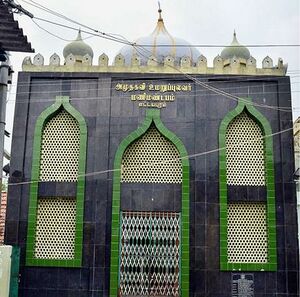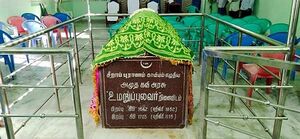Umaru Pulavar
இந்தப் பக்கத்தை தமிழில் வாசிக்க: உமறுப்புலவர்
Umaru Pulavar is a pioneer among Islamic poets in Tamil. He is the author of Seerappuraanam, an outstanding classical epic in Tamil. He belongs to the Tamil Islamic poetic tradition.
Birth, Youth
Umaru Pulavar was born in Nagalapuram village in Thoothukudi district in 1642. He is mentioned to have been born in Hijri 1052, Sha'ban month , 9th day (Pirai) in a poem written by a poet from the poetic tradition of Umaru Pulavar. Dr. M. M. Uwais maps this date to October 25, 1642 A.D. Umaru Pulavar died in the Hijri 1115 (1703). Therefore, Umaru Pulavar's period is generally predicted as A.D 1642 - 1703.
This information coincides well with the information we have regarding the periods of Umaru Pulavar's teacher, philanthropists who were his contemporaries, master in his religion. All historians accept that Seethakathi Vallal had asked Umaru Pulavar to write Seerappuraanam and had supported him. It has been established that Seethakathi Vallal lived between A.D. 1650 and 1713. It is also known that Umaru Pulavar had approached Arabic poet and master Seiku Sadakathullah Appa for guidance on the theme for an epic. Umaru Pulavar has written a song on Sadakathullah as part of his epic. Based on a song by Mohammed Theebi, who was a student of Seiku Sadakathullah Appa, the period for Sadakathullah Appa is said to be 17th century A.D. Umaru Pulavar's teacher, Kadikaimuthu Pulavar belongs to the later half of 17th century. Based on these information, it has been accepted that Umaru Pulavar lived during the second half of 17th century.
Private Life
Most of the notes received regarding Umaru Pulavar's life are based on hearsay. Seikabdul Khadir Nayinar Leppai Alim Pulavar was the very first publisher of Seerappuraanam. He has written the history behind the publishing of Seerappuraanam in detail. However there is not information about Umaru Pulavar's life. Kannakuhmadu Magdum Muhammad Pulavar who had reprinted many Islamic books, in his third publication, Seerappuraanam, had included few historic notes under the titles "Umaru Pulavar poorviga sarithira surukkam" and "Seerappuraanam seiyappatta sarithira surukkam".
According to these notes, Umaru Pulavar was born to Seiku Muhammad Aliyar living in Ettayapuram, in Hijri 1052. Umaru Pulavar's father belonged to a family involved in perfumes trade. The family had migrated from Kerala to Nagalapuram near Ettayapuram.
Umaru Pulavar learned Tamil under Ettayapuram Kadikaimuthu Pulavar. He received his Islamic education from master Seiku Sadakathullah Appa and his student Mohammed Theebi.
Literary Life
Having heard of Umaru Pulavar's excellence in poetry, Seethakathi Vallal (Seiku Abdul Kadhir) invited him to his village and requested him to write the biography of Muhammed the Prophet as a Tamil epic. Agreeing to the request, Umaru Pulavar stayed at Kilakarai and started writing the epic. He received the theme for the epic from the religious master and Arabic poet Seiku Sadakathullah Appa.
Seethakathi Vallal, who supported Umaru Pulavar, died before the epic could be completed. After him, Abul Khasim, a wealthy man from Parangipettai started supporting and sponsoring Umaru Pulavar for the epic.
Umaru Pulavar's Seerappuraanam does not contain the Prophet's later years. Few years after its completion, Phani Ahmed Marakkayar wrote the remaining songs and named them Seerappuraanam - Urijrathu Kaandam. This is referred to as "Chinna Seeraa". Both parts of Seerappuraanam were combined into one epic later by Munna Muhammed Khadri including some of his own additions.
Seerappuraanam is an epic that can be considered as an equal in its literary brilliance to the other great Tamil epics Civaka Cintamani, Silappatikaram, Manimekalai, Kambaramayanam, Periyapuranam.
Works on life
The book on Umaru Pulavar written by C. Nayanar Muhammed, written as part of the Indiya Ilakkiya Sirpigal series published by Sahitya Akademi was first published in 2001.
Death
Umaru Pulavar died in 1703 in Ettayapuram.
Ettappar had made an arrangement for the building of a memorial at the place where Umaru Pulavar was buried and an annual Kanduri festival to be celebrated on his death anniversary. This celebration festival had lost its significance for sometime. In 1912, a Tamil activist, Pitchaya Konar, erected a tomb for Umaru Pulavar in the Ettayapuram Muslim cemetery and celebrated Urs festival. The tomb became a Dargah over time and was renovated in 2006. People now worship at the Dargah.
Biography
The biography on Umaru Pulavar written by C. Nayanar Muhammed, written as part of the Indiya Ilakkiya Sirpigal series published by Sahitya Akademi was first published in 2001.
Works
- Seerappuraanam
- Muthumozhi Maalai
- Seethakkathi Thirumana Vaazhthu
- Seethakkathi Kovai - This book is unavailable
References
✅Finalised Page


